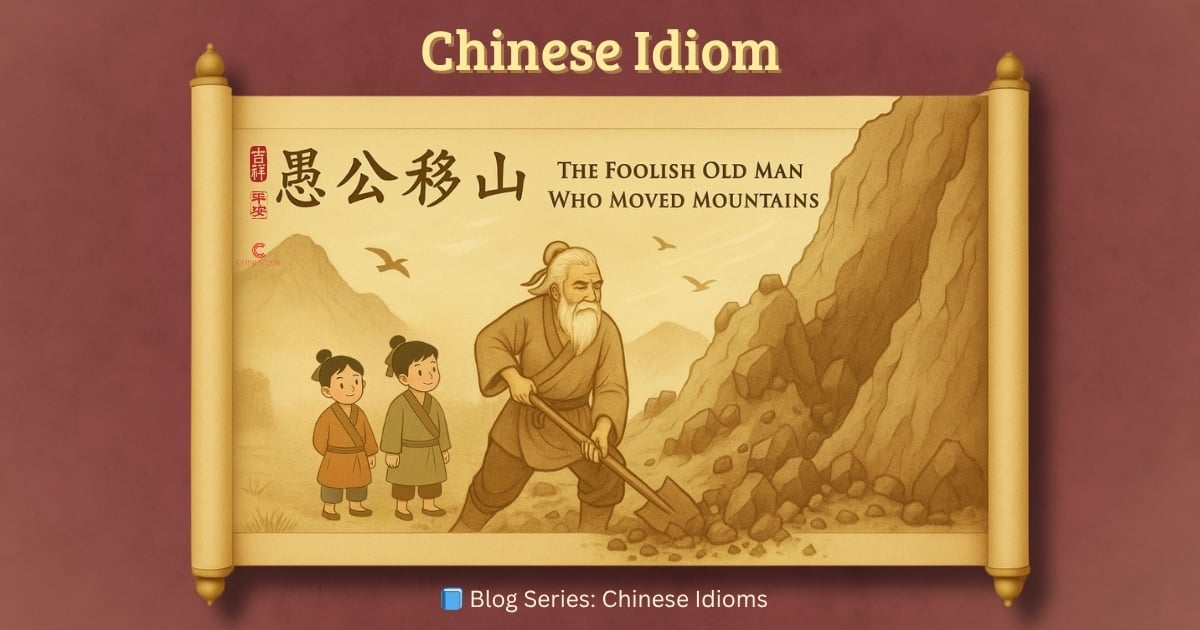🏔️ 愚公移山 yú gōng yí shān – The Foolish Old Man Who Moved the Mountains

🔍 What It Means
愚公移山 (yú gōng yí shān) literally means “The Foolish Old Man Moves Mountains.”
This idiom teaches perseverance. Even if something seems impossible, steady effort and determination can bring success.
Word-by-word:
- 愚 (yú) – foolish
- 公 (gōng) – old man / elder
- 移 (yí) – to move
- 山 (shān) – mountain
💬 Used to describe someone who never gives up, no matter how difficult the goal is.
In English, it’s like:
- 💪 “Where there’s a will, there’s a way.”
- 🐢 “Slow and steady wins the race.”
- 🚧 “Nothing is impossible with determination.”
🏺 Where It Comes From
This idiom comes from a story in Liezi (《列子》), an ancient Chinese text.
Long ago, a 90-year-old man named Yú Gōng lived with his family near two huge mountains.
Every day, they had to walk around the mountains just to go anywhere.
One day, Yú Gōng told his family, “Let’s move these mountains. Even if I die, my sons and grandsons can continue.”
His neighbors laughed. “You’re too old! How can you move mountains?”
But Yú Gōng didn’t stop. He dug with simple tools, little by little. His family helped him.
His spirit moved even the gods.
Touched by his perseverance, the gods sent two immortals to move the mountains for him.
💡 The message:
With strong will and generations of effort, even mountains can be moved.
💬 How to Use It
Use 愚公移山 (yú gōng yí shān) when talking about:
- long-term goals
- big, difficult tasks
- strong will and persistence
✅ Often used in motivational or inspirational contexts.
🎯 Real Examples
1. 他一直坚持写作,真是愚公移山的精神。
Tā yìzhí jiānchí xiězuò, zhēn shì yúgōng yí shān de jīngshén.
👉🏼 He kept writing every day — he really had the spirit of Yú Gōng.
2. 他们靠着愚公移山的毅力,终于建好了这条路。
Tāmen kàozhe yúgōng yí shān de yìlì, zhōngyú jiàn hǎo le zhè tiáo lù.
👉🏼 With the perseverance of Yú Gōng, they finally finished building the road.
⚠️ Common Mistakes (Watch Out!)
❌ Mistake: Using 愚公移山 to describe short-term tasks.
✅ Correct: Only use for long-term, hard work that needs strong willpower.
💡 Memory Tip

Picture an old man digging at the base of a mountain with a shovel — every day, with no rest.
He knows he won’t finish in his lifetime. But he believes someone will.
That’s 愚公移山 (yú gōng yí shān) — keep going, even when it’s hard.
🧩 Interactive Practice
Translate this sentence into English:
- 他有愚公移山的精神,从不放弃。
Answer:
He has the spirit of Yú Gōng — he never gives up.
🌟 Final Thoughts
愚公移山 (yú gōng yí shān) reminds us:
Even the biggest problems can be solved — if we don’t give up.
🌟 What’s your mountain to move?
Set your mind, take the first step, and keep going!
🏮 One story ends, but many more await…
👉 Stay tuned for the next idiom in this series!
Thank you for subscribing!
Have a great day!